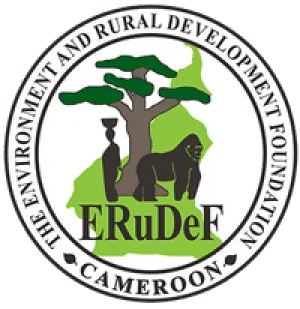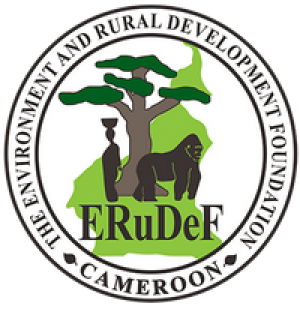[et_pb_section bb_built=”1″][et_pb_row][et_pb_column type=”4_4″][et_pb_text _builder_version=”3.1.1″]
On April 12, 2004 the world woke up with breaking news that another sub-population of the Cross River gorillas has been discovered in a hitherto unknown forest location and further unknown local conservation organization, the Environment and Rural Development Foundation (ERuDeF). This breaking news came at a time when the major conservation players in the Cameroon-Nigeria border region (WCS, WWF, FFI etc) were actively engaged in the survey of the remaining fragmented forest patches in this border region in search of new sub populations of the Cross River gorillas.
The Cross River Gorillas are the most critically endangered primates in Africa and one of the 25 world most endangered wildlife species. With a population of just about 300 individuals in the wild, there was and there is still a ‘man hunt’ for the sub-populations of these gorillas.
The entry of Taiwan’s Forestry Bureau/Conservation Division in Cameroon in 2004 was the start of a long journey of conservation support in Cameroon by the Government of Taiwan. This support came at a critical time to fill the gap of limited international funding to support the great apes conservation program in the newly established Lebialem Highlands Great Apes Conservation Program in South West Cameroon. This annual funding that has continued up till 2013 continues to provide timely support to keep the conservation program.
The outcomes of the Taiwan’s conservation support in Cameroon have been primarily focused in the Lebialem Highlands of South West Cameroon. These include but not limited to;
In 2004/2005, Taiwan’s support led to the new discovery of new sub-populations of the Nigeria-Cameroon Chimpanzee and extended the knowledge of its distribution in Cameroon. In this regard, three new sites namely the Tofala, Mak-Betchou and Nkingkwa Hill forests were identified. Given this new distribution map, and the role ERuDeF was playing, the major actors in the Nigeria-Cameroon border region resolved to invite ERuDeF to become an active member of the Nigeria-Cameroon Cross River Gorilla Conservation Group. This major success in 2006 caused the Lebialem conservation site to be included into in to the IUCN published Nigeria-Cameroon Cross River Gorilla Action Plan.
In 2007/2008, further support from Taiwan was critical in the establishment of the genetic Corridor linking the Tofala gorillas with those of the Takamanda-Mone Forests. From 2009 through 2011,Taiwan’s conservation support was also important in the final establishment of the Lebialem Highlands Conservation Complex. This Complex is comprised of six proposed conservation sites including the proposed Tofala Hill Wildlife Sanctuary, proposed Mt Bamboutos Integral Ecological Reserve, the designated Tofala Mone Wildlife Corridor, Mak-Betchou proposed Wildlife Sanctuary, Nkingkwa Hill Forest and the Nyi-tebongFuagonkem Hills Reserve.
In 2010, with funding from Taiwan and other partners, ERuDeF launched the process of assisting the government of Cameroon to create the proposed Tofala Hill Wildlife Sanctuary. This process is continuing and is expected to be completed in 2013 with a Prime Ministerial Decree.
Besides the active support of conservation process, Taiwan’s support has also gone to support the biological monitoring of the great apes populations across the Tofala-Mone proposed wildlife Corridor, the proposed Tofala Hill Wildlife Sanctuary and the Mak-Betchou forest. Bio-monitoring is critical in providing important updates on the status and distribution of gorillas and Chimpanzees to support government action. Taiwan’s support has also been important in building the human resource capacity of some young Cameroonians. Two of ERuDeF’s staff are currently pursuing a Ph.D in primates conservation, a further third had earlier completed with an M.Sc in Primates Conservation. The Environmental Education Program has been strengthened in schools with the creation of school clubs and networks as well as the school’s environmental newsletter.
Finally, the Livelihoods and Economic Development Program has continued to receive an annual booster with support from Taiwan. Many income generating projects have been supported and most especially the livestock, agroforestry and the palm oil mills.
The Taiwan’s Aid to Cameroon has been continuous with a firm commitment to support the long-term conservation of Cross River gorillas and Nigeria-Cameroon Chimpanzees in Western Cameroon.
By Louis Nkembi and Regina Leke
[/et_pb_text][/et_pb_column][/et_pb_row][/et_pb_section]

